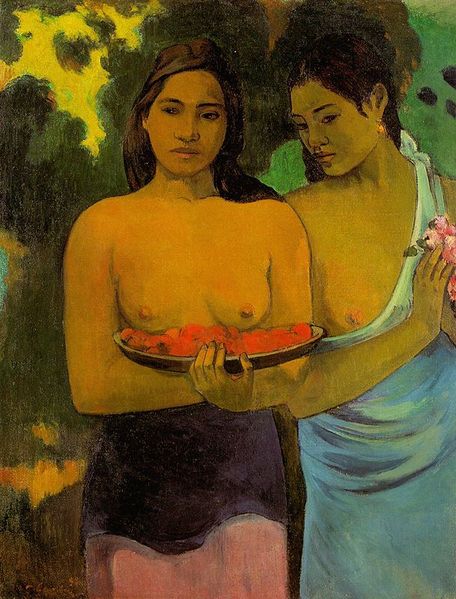
This month we have a piece by Catherine Lacey on her love-affair with F. Scott Fitzgerald’s first book, This Side of Paradise (and with a certain hollow-eyed lad who played literary house with her in an old abandoned mansion).
Paradise was not the first book Fitzgerald sent out for publication, he’d already had one novel rejected, but it marked his first interaction with a young editor at Scribner named Maxwell Perkins. Perkins, who would later go on to edit such literary lights as Ernest Hemmingway and Tom Wolfe, saw something in this brave new writer and interceded on his behalf to get the novel published.
To the 22-year old Fitzgerald, who had recently broken up with Zelda and spent a summer drinking himself to a stupor, the novel was also a way to prove himself–to get back into Zelda’s good graces.
Click here for Catherine Lacey’s essay An Adamant Recommendation.
A bit of ephemera: The title for This Side of Paradise came from a Rupert Brooke poem called Taire Tahiti
*Painting by Gauguin titled Two Tahitian Women
Tiare Tahiti by Rupert Brooke
Mamua, when our laughter ends,
And hearts and bodies, brown as white,
Are dust about the doors of friends,
Or scent ablowing down the night,
Then, oh! then, the wise agree,
Comes our immortality.
Mamua, there waits a land
Hard for us to understand.
Out of time, beyond the sun,
All are one in Paradise,
You and Pupure are one,
And Tau, and the ungainly wise.
There the Eternals are, and there
The Good, the Lovely, and the True,
And Types, whose earthly copies were
The foolish broken things we knew;
There is the Face, whose ghosts we are;
The real, the never-setting Star;
And the Flower, of which we love
Faint and fading shadows here;
Never a tear, but only Grief;
Dance, but not the limbs that move;
Songs in Song shall disappear;
Instead of lovers, Love shall be;
For hearts, Immutability;
And there, on the Ideal Reef,
Thunders the Everlasting Sea!
And my laughter, and my pain,
Shall home to the Eternal Brain.
And all lovely things, they say,
Meet in Loveliness again;
Miri’s laugh, Teipo’s feet,
And the hands of Matua,
Stars and sunlight there shall meet,
Coral’s hues and rainbows there,
And Teura’s braided hair;
And with the starred ‘tiare’s’ white,
And white birds in the dark ravine,
And ‘flamboyants’ ablaze at night,
And jewels, and evening’s after-green,
And dawns of pearl and gold and red,
Mamua, your lovelier head!
And there’ll no more be one who dreams
Under the ferns, of crumbling stuff,
Eyes of illusion, mouth that seems,
All time-entangled human love.
And you’ll no longer swing and sway
Divinely down the scented shade,
Where feet to Ambulation fade,
And moons are lost in endless Day.
How shall we wind these wreaths of ours,
Where there are neither heads nor flowers?
Oh, Heaven’s Heaven! — but we’ll be missing
The palms, and sunlight, and the south;
And there’s an end, I think, of kissing,
When our mouths are one with Mouth…
Tau here, Mamua,
Crown the hair, and come away!
Hear the calling of the moon,
And the whispering scents that stray
About the idle warm lagoon.
Hasten, hand in human hand,
Down the dark, the flowered way,
Along the whiteness of the sand,
And in the water’s soft caress,
Wash the mind of foolishness,
Mamua, until the day.
Spend the glittering moonlight there
Pursuing down the soundless deep
Limbs that gleam and shadowy hair,
Or floating lazy, half-asleep.
Dive and double and follow after,
Snare in flowers, and kiss, and call,
With lips that fade, and human laughter
And faces individual,
Well this side of Paradise!…
There’s little comfort in the wise.
Rupert Brooke, Papeete, February 1914